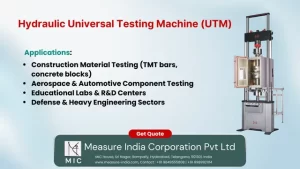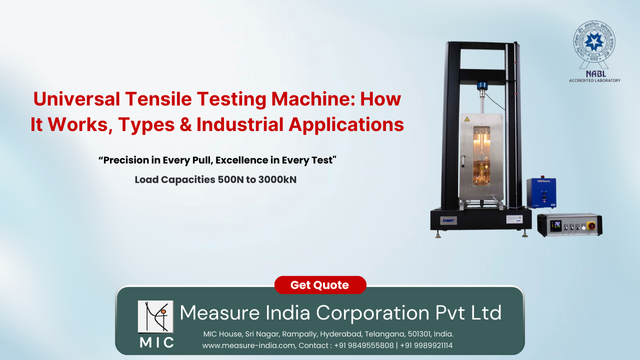
Universal Tensile Testing Machine: How It Works, Types & Industrial Applications

Imagine a car speeding down a highway. The seat belts inside that car must be strong enough to handle a sudden impact. Now think about an airplane flying at high altitudes—its body must withstand extreme pressure and temperature changes. Even in construction, steel rods need to hold up massive buildings for decades.
This is where a Universal Tensile Testing Machine (UTM) comes into play. It is used to test the strength, flexibility, and durability of materials before they are used in real-world applications.
Think of a gym machine that measures your strength. Just as weights help test muscle power, a UTM applies force to a material to measure its strength. The machine grips the sample tightly and applies a controlled force, increasing it gradually until the material breaks or deforms.
The key parts of a UTM include a load frame, grips, a load cell, a crosshead, and control software. The load frame is the body of the machine where the testing happens. The grips hold the material in place. The load cell measures the force applied. The crosshead moves up or down to stretch or compress the sample. The control panel and software record the data and generate reports.
During testing, the machine pulls or presses the material while measuring key factors like maximum load, elongation, and failure point. This information is used to ensure materials meet safety standards and perform as expected in real-world conditions.
Electromechanical UTMs use a motor and screw system to apply force. They are best for testing light to medium-strength materials like plastics, textiles, and wires. They offer high precision and control, making them ideal for industries that require detailed analysis of material behavior.
Hydraulic UTMs use hydraulic pressure to apply force. They are designed for heavy-duty testing, making them perfect for metals, concrete, and aerospace components. These machines can apply extremely high loads, making them essential for industries dealing with strong and rigid materials.
In any industry, the failure of a material can lead to disasters. Tensile testing ensures that materials are safe, durable, and reliable before they are used in manufacturing. In automotive engineering, UTMs test materials used in seat belts, airbags, car bodies, and tires to make sure they can withstand impact forces. In the aerospace industry, they evaluate materials that must survive high-altitude pressures, extreme heat, and cold temperatures. In construction, tensile tests confirm that steel rods, concrete, and glass panels can endure heavy loads, vibrations, and earthquakes.
Biomedical engineering also relies on tensile testing to verify the strength and flexibility of prosthetics, surgical implants, and artificial joints. Even the packaging industry depends on UTMs to test materials like plastic, rubber, and metal to ensure products can withstand shipping and handling stress.
Technology is changing the way materials are tested. AI-powered UTMs can now predict material failures before actual testing, saving time and reducing waste. IoT-enabled UTMs allow engineers to monitor test data remotely, ensuring better analysis and record-keeping.
Micro and nano-scale UTMs are becoming more important for industries working with tiny electronic components, biomedical implants, and nanomaterials. High-temperature tensile testing is now used in sectors like jet engine manufacturing and nuclear power, where materials need to withstand extreme conditions.
With the rise of 3D printing, UTMs are evolving to test custom-designed materials that are being used in aerospace, healthcare, and automotive industries. New testing techniques are being developed for self-healing materials, which can repair themselves when damaged. As industries push toward sustainability, UTMs are being optimized to test eco-friendly and biodegradable materials, helping create a greener future.
As industries innovate and materials become more advanced, tensile testing remains a crucial step in ensuring product reliability, safety, and performance. Whether it’s a car seat belt, an airplane wing, or a skyscraper’s steel frame, a Universal Tensile Testing Machine helps ensure that everything we rely on is built to last.
Office Address : Universal Testing Machine Supplier in India
MIC House, Sree Nagar, Ram pally,
Hyderabad – 501301, Telangana, India
Website: www.measure-india.com
Phone: +91-9989921114
Email: info@measure-india.com